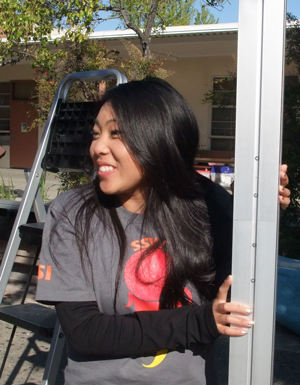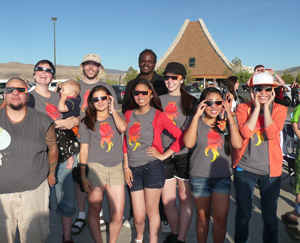Fond Remembrances of My Days with Multiverse

Carmen Zheng helps assemble the Surfin’ the Solar Wind traveling activity booth for the first time.
On May 20, 2012, I was sitting in the back of a crowded minivan, basking in the cool breeze of the air conditioning and gazing out the window as the flashing city lights of Reno, Nevada whizzed by. Although glamorous hotels, slot machines, and neat souvenir shops basically surrounded our car, I was not looking at the streets – I was looking at the sky. May 20th was the date of an annular solar eclipse.

The Surfin’ the Solar Wind high school interns, team, and volunteers observe the 2012 Annular Solar Eclipse in Nixon, NV. Carmen Zheng, the author, is the second intern on the right.
We were headed to the small town of Nixon, Nevada, about an hour outside of Reno, where we would be directly underneath the passing of the moon between Earth and Sun. I was with my Space Sciences Lab family; i.e., Multiverse’s Surfin’ the Solar Wind program. Our program was entirely funded by NASA, and we met as a group (about eight high school students from around the Bay Area) at the Space Lab each week, discussing, analyzing, and most important of all, learning about the Sun, as well as NASA’s and UC Berkeley’s newest space experiments. We would then gather the information and simplify the knowledge to create exhibits, a traveling toolkit and an elaborate space science booth we took with us to fairs and events across the state. With our trip to Nevada, we had taken our Surfin’ booth across borders.
I was a junior in high school then, but I remember clearly the entire three-day trip, and of course, the four years I was part of the Surfin’ program. Growing up in a low-income Oakland neighborhood raised by immigrant parents, it was the opportunity of a lifetime. When I was young, after helping my grandfather with the dishes, I recall looking out from behind my small house’s barred windows. Even with the harsh streetlamps and the neon glow of the liquor store across the street, I could make out the twinkling stars above me. I would count these stars until I heard the familiar hissing of the bus down the road, meaning my parents were finally home from a long day at work.
As I grew older, I realized it was impossible to count the stars without the proper tools. When I saw a $15 telescope at the flea market that weekend, I begged my grandfather for an early birthday gift. It was probably the most luxurious item I owned as an 8-year-old. It may not have been much, but for a few of the neighborhood kids and me, it was everything – it was a path to the stars and thus, a path to other worlds. On hot summer nights, we sat on the roof of my house, pretending we could see Pluto through our little telescope and pretending none of our problems existed. But soon, homework replaced those nights of stargazing, and instead of worrying about my parent’s worries, I was old enough for it to be my burden as well. I started taking on odd jobs to help pay for groceries and began a college fund. I closed my window to the stars, to the gunshots I heard more frequently outside my house, and to everything I wanted to run away from.
I joined Surfin’ the Solar Wind my freshman year of high school thinking it was going to be another dry extracurricular program. Instead, something else happened. The first time I adjusted the lens of a $5,000 telescope through a laptop touchpad with a young child looking over my shoulder as I explained sunspots, I remembered the wild alien stories I used to tell on the rooftop when I was young. I did not have to run away. With every solar-powered fountain and other exhibits I built, presentation about auroras I made, and even riding a train for the first time to travel to another state to see a solar eclipse, I knew my Multiverse internship program had not only rekindled a passion, but it had reopened my window to the stars. I discovered my future.
I now attend UC Berkeley studying Astronomy. Some of the other Surfin’ interns I left behind when I graduated still had a few years before they were to leave for college, but were unable to continue with the program due to cuts in funding from NASA. I was fortunate enough to have the Surfin’ team and the astrophysicists at the Space Lab by my side all four years of high school. They were the ones who watched me learn, fail, grow, and ultimately, succeed. The Surfin’ program and Multiverse team taught me to face my problems and to stand on a mountaintop with my telescope not so that the world could see me, but so that I could see the world.
-- Carmen Zheng, UC Berkeley student
1465